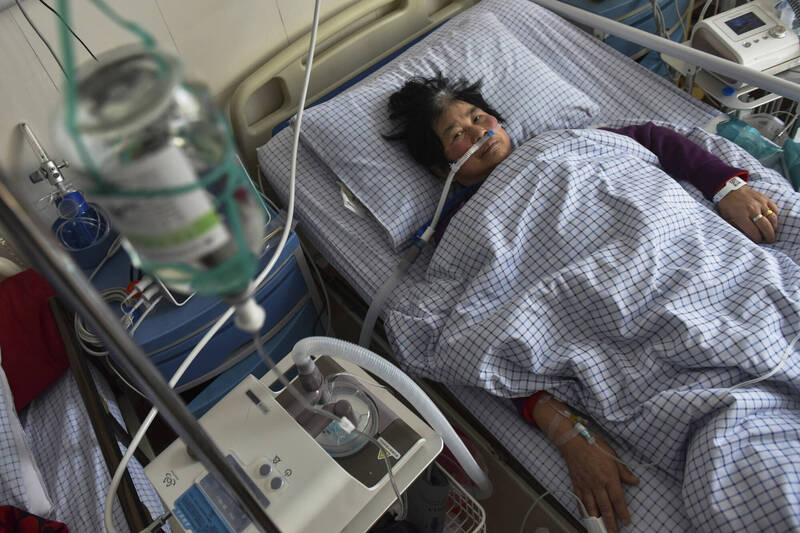The high medical expenses of patients infected with the epidemic in China has become another social problem. The picture shows a woman in Anhui who was admitted to the hospital for treatment.
(AFP)
[Compiled by Wei Guojin/Taipei Report] After Beijing suddenly revoked the zero-clearing epidemic prevention policy last month, causing an unprecedented epidemic to sweep across the country, at least 14 provinces and cities in China announced that they would stop providing free treatment to the infected people, which put a heavy burden on the patients The pressure of medical debt is increasing, and the risk of bankruptcy is soaring.
The Financial Times reported that hospitals in Shanghai and Guangzhou currently charge 20,000 yuan (90,000 Taiwan dollars) in medical expenses for critically ill patients currently admitted to intensive care, which is equivalent to five months' income of ordinary urban residents.
Although insurance companies sold tens of millions of low-priced epidemic prevention policies before, in order to avoid huge compensation, they strictly reviewed and approved claims related to the epidemic.
Please read on...
Chinese policies also make it difficult for claimants to prove infection.
Health officials narrowed the definition of cases and deaths from the Wuhan pneumonia, prompting the World Health Organization (WHO) last week to accuse China of underreporting the severity of the outbreak.
A director of Beijing Taikang Insurance said that the company’s approval of claims is “very strict”, “you have to get a certificate of infection from the hospital, and the hospital rarely issues relevant documents”.
According to the report, this puts great pressure on low-income patients and exposes the unfairness of China's medical system.
Huang Yanzhong, a researcher at the Council on Foreign Relations, said, "China has never made its medical system accessible or affordable to everyone, and the recent outbreak has exacerbated the problem."
Anhui, a city with a population of 64 million, started last week to require citizens to pay 30% of the medical expenses related to Wuhan pneumonia. The city of Sanhe, which is close to Beijing, went further and required infected patients to pay 50% of the medical expenses.
This places a heavy financial burden on many patients.
Gao Shengli (transliteration), a 53-year-old farmer in Henan Province, was tested positive for Wuhan pneumonia last week and suffered a stroke. Two days after he was admitted to the hospital, he received a bill of 150,000 yuan (674,000 Taiwan dollars), which was more than twice his family’s annual income. The extra bills ranging from 5,000 to 10,000 (TWD 23,000 to 45,000) made his family miserable. His son said, "The hospital collects debts from us every day, and we can't afford it."
The urban middle class has fared no better.
A doctor at the Shanghai Tenth People's Hospital said that they had received instructions from the Shanghai Municipal Health Commission to limit the diagnosis of pneumonia in Wuhan. "We were advised to diagnose most cases as respiratory infections."
A consultant to China's National Health Commission pointed out that "the epidemic broke out too quickly, and the authorities did not have time to formulate an action plan. What is certain is that the government cannot provide free treatment for everyone."
In Hangzhou, marketing manager Frank Wang bought an epidemic prevention policy early last year, but was refused to issue a certificate of infection after being diagnosed with lung and kidney infections. He said, “The hospital clearly stated that it is difficult to obtain a certificate of infection because the Diagnosis has been politicized," said he, who paid 20,000 yuan (90,000 Taiwan dollars) for the treatment, "which makes patients like me victims."
Related news please see:
Please click here for the "Wuhan Pneumonia Zone", for more information, you can grasp it first-hand.
